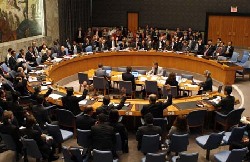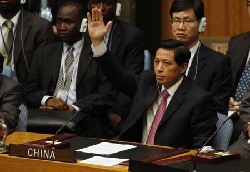
The UN Security Council on Friday unanimously approved expanded sanctions and a trade and arms embargo against the Democratic People's Republic of Korea (DPRK) over its May 25 nuclear test.

The United Nations Security Council unanimously votes to adopt a resolution that expands financial sanctions and the UN trade embargo on the DPRK during a meeting of the Council at the UN headquarters in New York June 12, 2009. [Agencies]
The sanctions resolution bans all weapons exports from the DPRK and most arms imports into it. It authorizes UN member states to inspect Pyongyang's sea, air and land cargo, requiring them to seize and destroy any goods transported in violation of the sanctions.
The sanctions include increased financial restrictions and a tighter arms embargo with the exception of light weapons.
The resolution condemns the DPRK and demands that it refrain from conducting any more nuclear tests or test-firing ballistic missiles.
It declared that Pyongyang should abandon all nuclear weapons and existing nuclear programs in a complete, verifiable and irreversible manner and immediately cease all related activities. The DPRK should immediately retract its announcement of withdrawal from the Nuclear Non-Proliferation Treaty, too.
The new sanctions extend the assets freeze and travel ban decreed in a 2006 resolution to additional DPRK entities, goods and individuals, too.
On Oct 14, 2006, the UN Security Council had unanimously passed Resolution 1718, imposing limited military and economic sanctions on the DPRK for conducting a nuclear test on Oct 9.
In Beijing, experts were divided on the severity of the new sanctions but agreed that they were a warning to the DPRK to follow international norms.
Wu Miaofa, former member of China's delegation to the UN, said the other five members in the Six-Party Talks think the new sanctions would make the DPRK reconsider its "super-tough policies".
But Wu warned the DPRK could refuse to "understand the message" and test-fire more missiles in response.

China's Ambassador to the United Nations Zhang Yesui votes with the Security Council in a unanimous vote to adopt a resolution that expands financial sanctions and the UN trade embargo on the DPRK during a meeting of the Council at the UN headquarters in New York June 12, 2009. [Agencies]
Lu Chao, a researcher with the Liaoning Academy of Social Sciences, said it was the "harshest ever" sanctions against the DPRK. "It can be presumed that the DPRK will respond strongly to them" by test-firing more medium-range or even long-range missiles.
But the experts ruled out the chances of the DPRK going into a war with any of its neighbors.
Other experts said the sanctions would be partly effective. Describing the current sanctions as "clever" instead of a "crime-and-punishment" game, Marcus Noland, an expert with Washington-based Peterson Institute for International Economics, said they are "basically defensive".
The DPRK could conduct another nuclear test, a US official said. But the ROK's Yonhap news agency quoted an unidentified intelligence official as having said there was no imminent indication that the DPRK was restoring the site where it conducted its second nuclear test on May 25.